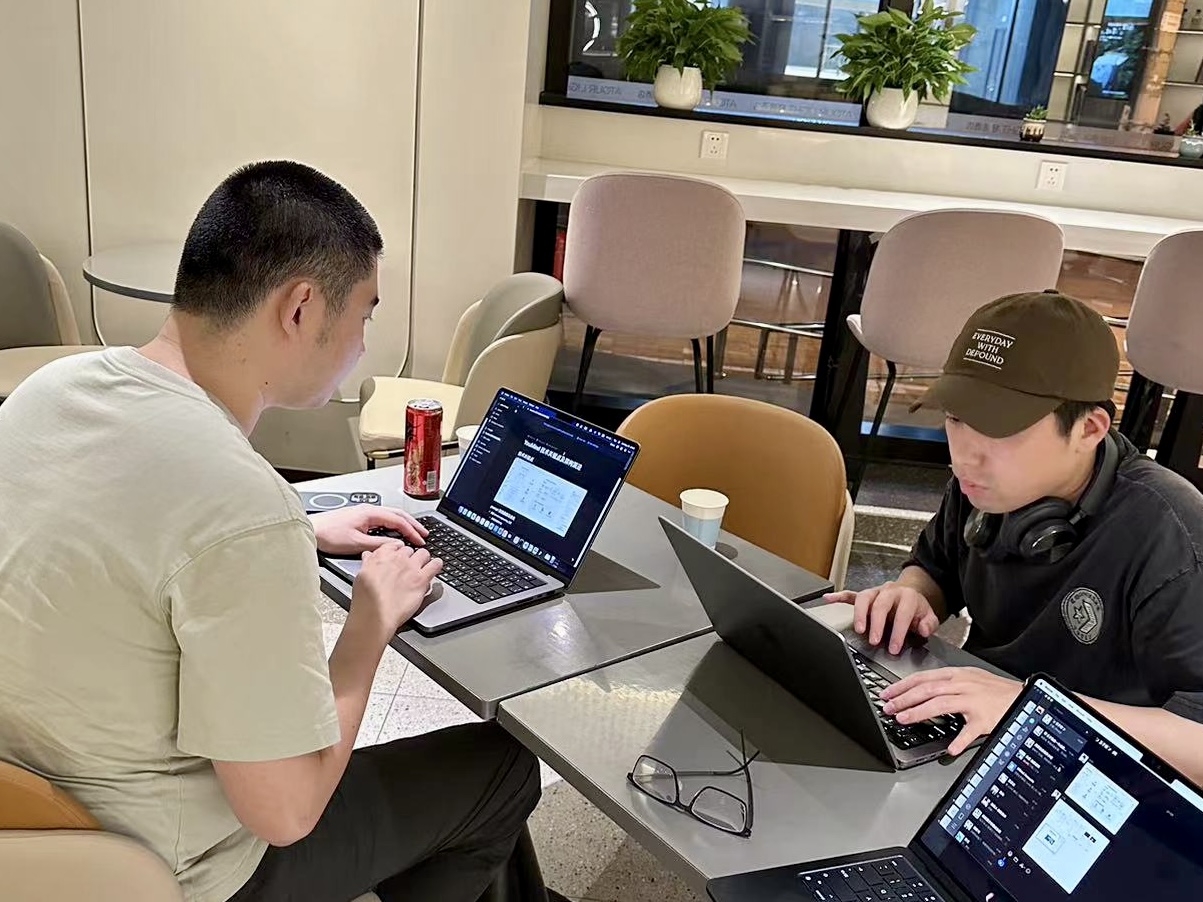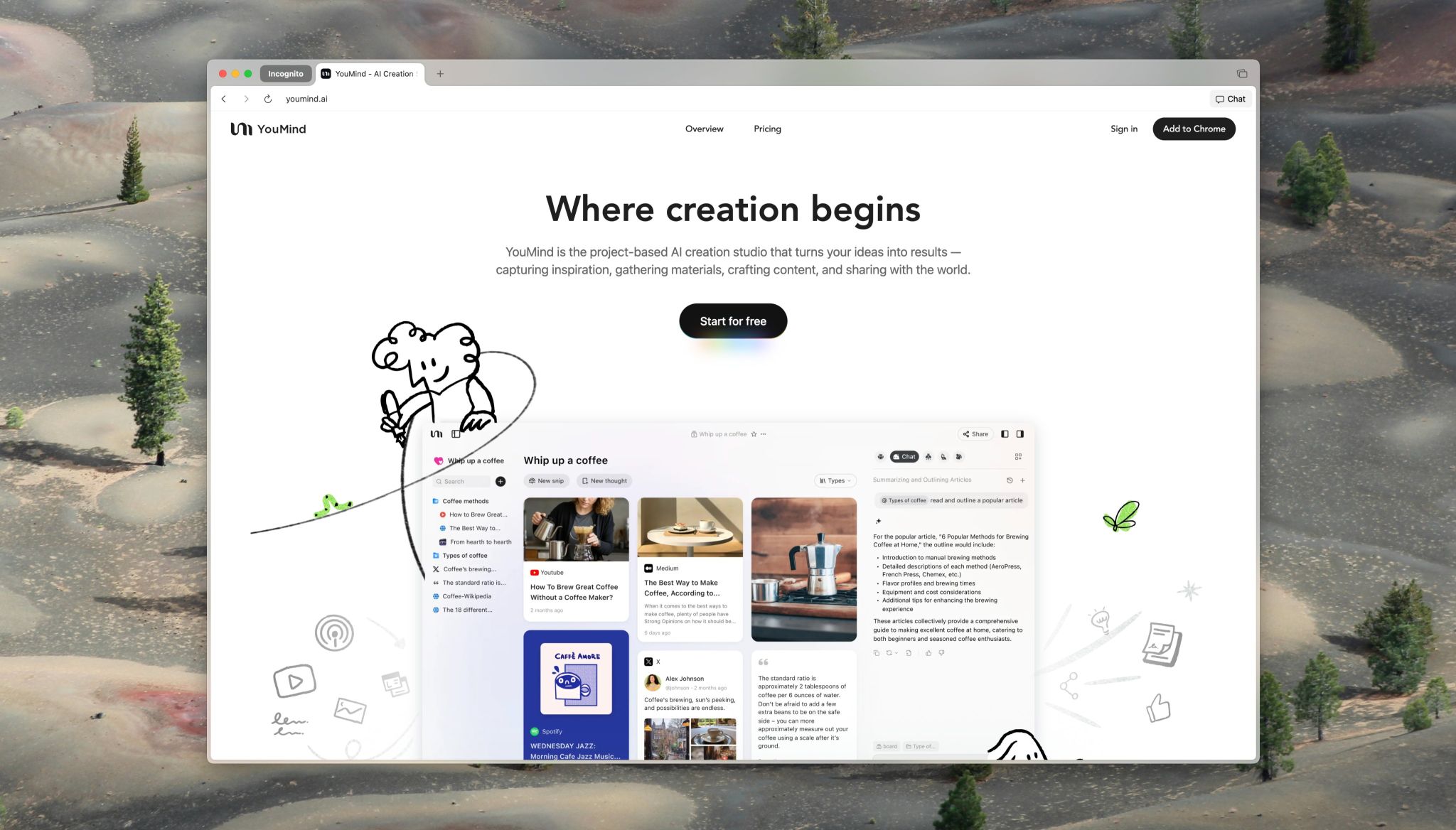Genesis of a Dream
Before founding YouMind, Frank and my prior experience involved developing the product Yuque. Those years saw the product reach the milestone of tens of millions of users, but due to various reasons, we both eventually moved on from it. Measured by conventional standards, that journey might not be considered a complete success, but it was undoubtedly where our dream for creator tools first took root.

Looking back to around 2015, we began incubating Yuque within Ant Group. At that time, the entire market was transitioning from traditional online documents to what we now call "new docs." Document capabilities were undergoing an unprecedented evolution; it was hard to imagine back then that documents could embed data tables or incorporate workflows. Much like the new generation of online document products emerging from Silicon Valley, we recognized this paradigm shift. Combining this observation with the document management needs we encountered internally, we committed ourselves to the knowledge base space.
We started with a Markdown editor, eventually expanding our service to cover the entire Alibaba Group (around 300,000 employees at the time). From there, we evolved from internal software to also serving external users, launching a commercial version for both individuals and enterprises. For years, we remained deeply immersed in the fields of knowledge management and document collaboration. This prolonged focus gradually honed our understanding of creation and knowledge processing, and naturally, we developed a strong emotional connection to this domain. This deep-seated connection is a significant reason why we decided to embark on a new journey and create YouMind.
Of course, to be candid, as a startup team, we engaged in considerable initial exploration. We spent half a year investigating potential directions. During that time, Frank and I frequented city cafes, hashing out early concepts and prototypes. We explored various paths, only to discover that the persistent dedication and unfinished vision we held for creator tools exerted a powerful pull, ultimately drawing us back to this familiar territory. Often, the driving force behind a decision isn't just accumulated experience, but that inherent, undeniable passion itself.

The Unfinished Dream
While Yuque might not have been a commercial success in my view, its value to individuals and teams in the knowledge base domain is undeniable. Furthermore, our design choices in this area influenced many subsequent products that aimed to deliver documents with structured features.
However, Yuque primarily addressed the challenges of "writing things down" and "managing them." Looking back, its strength lay in structured knowledge capture and management—essentially, the downstream stages of the creation process. This made it highly effective for work collaboration documents. Yet, precisely because of this focus, when it came to 'creation' itself—especially the capturing and nurturing of ideas at their very inception—Yuque's structure felt relatively rigid. Its support was limited for the kind of expressive process that demands greater freedom and flexibility.
In my opinion, the act of "creation" goes far beyond mere recording and isn't confined to the written word; it's fundamentally a process involving thought and expression. There's no shortage of excellent writing tools on the market, like Notion or Obsidian, which capably handle well-formed text. However, the real difficulty in creation often isn't the 'writing' itself, but rather that 'ignition point'—the moment of transition from nothing to something, from vague idea to clear concept.
When an idea flickers like a faint glimmer in the mind, how do you capture it? How do you find fertile ground for it to take root and blossom? How do you build its initial structure? This is often the first significant hurdle that creators face.
Therefore, in moving from Yuque to YouMind, our aim is to return to the very core of creation. We want to build an integrated, AI-powered creation workspace that supports the entire journey—from information gathering and assisted reading to sparking inspiration and aiding the creative process itself. Our goal is to progressively help users organize their thinking frameworks and ultimately express their ideas seamlessly.
The power of expression is immense. We believe YouMind serves not only those who need to create but also those kindred spirits, like ourselves, who aspire to deeper thought and freer expression.
Forging Ahead
Years later, as we step back onto the path of creating tools for creators, we still feel a considerable sense of excitement. Fueled by the vision of exceptional creator tools, we aspire to build an effective and intuitive instrument for everyone who wishes to express themselves. This isn't just about our product dream, nor is it solely because we are its creators and developers. More fundamentally, we embody the countless individuals dedicated to continuous learning and deep thinking.
It is this profound sense of kinship that drives us forward with conviction.
Especially against the backdrop of the rapid rise of Large Language Models (LLMs) in the last two years, we are filled with unprecedented confidence and hope for the future of creator tools, and for the potential of YouMind.
Previously, finding information might have required consulting experts or relying on Google searches—often an inefficient process hampered by excessive noise and irrelevant information. Those not skilled in using search tools could easily be misled by inaccurate or low-quality information.
The boundaries of one's perspective often dictate the depth and breadth of their thinking. The emergence of LLMs has vastly broadened our horizons in the dimension of information access. They lower the barrier to entry, providing more comprehensive and in-depth support for understanding content.
Take my personal observation as an example: In the past, gaining an in-depth understanding of specialized fields, such as North American tax law, might have required hiring experts and incurring significant costs (e.g., hundreds of dollars). Today, by leveraging large language models, one might obtain a substantial overview and key information at a relatively minimal cost (e.g., tens of dollars). This not only enhances the efficiency of information acquisition but, more importantly, empowers individuals with stronger independent judgment, reducing cognitive biases caused by information barriers.
The efficiency gains and cognitive expansion brought about by LLMs in information access are equally profound for creator tools, signaling that the creation process itself can also be deeply reshaped.
Reshaping the Creator Ecosystem
As mentioned earlier, I believe the rise of large language models presents exceptionally favorable conditions for creators. From my perspective, the development of this technology isn't a threat. Many worry that overly powerful AI might eventually replace their own output. While I've entertained such future possibilities, focusing on the present, I see AI development more as a powerful accelerator for creators, or perhaps like the partner we traditionally envision—a companion capable of offering suggestions and handling tedious tasks during the creative process.
Consider reading a classic novel like Dream of the Red Chamber, known for its immense length and complexity. A dedicated reader might take a month, reading two hours daily, to finish it. For an LLM, processing it could take mere moments. In doing so, it can help pinpoint core themes and extract key materials you need. Of course, one might argue that such reading lacks the emotional depth and human understanding of literature. Indeed, current LLMs operate based on predictive logic to "understand" and generate responses; they do not possess innate human comprehension or empathy.
However, as an input source for information, AI is more than capable of supporting almost any query, akin to carrying a mobile knowledge vault with you at all times. From this angle, it can fully assume the role of a valuable partner.
These capabilities were hard to imagine just two years ago. But precisely because of such continuous technological evolution, our cognition and access to information are undergoing fundamental changes. Especially for creators, we can now acquire more information in less time and more effectively, allowing us to focus more intensely on thinking and expression during the creation process. This will undoubtedly drive significant progress across the entire creator ecosystem.
Furthermore, the development of generative models isn't limited to text. Advances in video and image generation also provide creators with richer sources of inspiration while simultaneously lowering production costs.
And this is merely the tip of the iceberg. For creator tools, the transformative potential brought by LLMs extends far beyond this.
YouMind's product design benefits greatly from the advancements in large language models. At the same time, we are acutely aware that AI cannot dominate everything on the path of creation. For a long time to come, a synergistic relationship will be necessary.
We believe the soul of creation lies in human thought and emotion. YouMind, riding the wave of AI, aims to provide users with more suitable tools, offering assistance and sparking inspiration.
Take our first feature, AI Collection, as an example. We are neither a traditional product focused solely on storage, nor do we hand everything over to AI. Our browser extension helps users identify relevant and valuable information while reading web pages. Our Board feature further assists users in filtering valuable insights from a multitude of collected items. Through this process, we hope to use AI tools to help users reduce information entropy—making information more orderly and transforming it into a usable state.
Another example is our AI writer, currently under development. The entire history of a "Thought's" evolution has become a core design element, alongside our Agent capabilities. We believe that striving for a perfect, one-shot output with AI is often unwise in creative work. Instead, the process thrives on continuous thinking and refinement through collaboration with AI. This makes the history function for Thoughts particularly crucial. It allows you to see your own contributions alongside AI's, track the reasoning behind each modification, and truly witness the journey from initial idea to final output.
Looking Ahead
The pace of technological development today is truly staggering; it's conceivable that another revolutionary product could emerge as soon as next month. But regardless of how technology evolves, I believe that creation, thinking, and expression are timeless human endeavors.
What YouMind aims to do today is to keep pace with these advancements, step by step, enabling our creators to more effectively bring their ideas to fruition. Of course, in this era of information explosion, we also hope that YouMind can play a more significant role within the creator ecosystem—making high-quality, thoughtful content more easily accessible, and helping information find its most fitting destination as it flows.
Therefore, looking to the future, we envision YouMind as more than just a tool. We aspire for it to be a partner, a friend, and an active participant in shaping the future information landscape.
